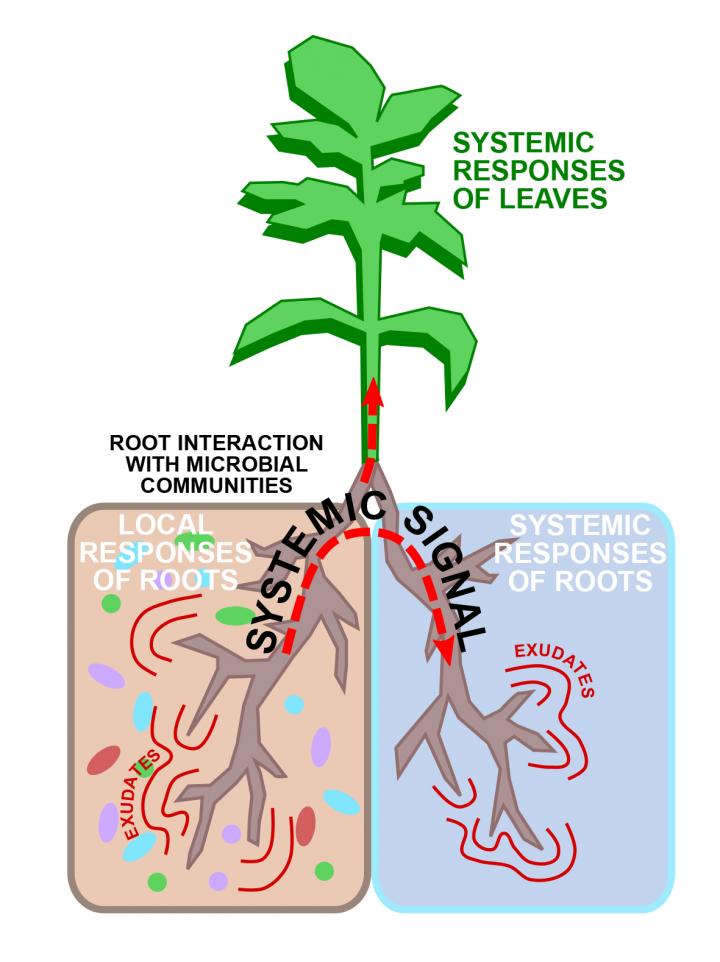
Credit: J. Szymanski / IPK
Gatersleben, 07.02.2020 Roots are plant organs, that typically absorb water and minerals from soil. It is lesser known that roots also secrete metabolites, so-called root exudates, which impact the properties of soil directly around the root. This thin layer of soil is called the rhizosphere and is home to a rich microbial diversity, the root microbiota. By producing certain exudates, plants communicate with and govern the microbial life within their rhizosphere for their own benefit. Now, researchers have discovered that this is not a one-way process. Whilst investigating tomato plants, they found that the microbiota can also systemically shape and control root exudation.
When thinking of ecological hotspots, roots and the earth surrounding them might not immediately spring to mind. However, precisely this region, the rhizosphere, is considered as one of the most complex ecosystems found on earth. It harbours a divers microbiotic community, including numerous bacteria, fungi and archaea, thriving in an environment rich in biochemical compounds, that are exuded by plant roots at the core of the rhizosphere.
Plants govern the rhizosphere microbiota and shape the soil physical and chemical properties through their root exudates. At the same time, it is well known that roots sense changes in the rhizosphere and trigger systemic responses to defend against pathogens or to adjust to changes in nutrient availability. Nonetheless, there are still many open questions regarding the dynamics and impact of the microbiota on the root itself, and it was not clear how, or whether at all, the rhizosphere microbiota affects the root exudation. An international research team led by Dr. Elisa Korenblum, a scientist from the Weizmann Institute of Science in Israel in collaboration with Dr. Jedrzej Szymanski from the Leibniz Institute IPK in Gatersleben, recently took on this question whilst investigating roots of tomato plants.
Dr Korenblum and her team conducted and analysed a row of split-root experiments, where half of roots of each plant was exposed to a microbiome-rich soil, and the other half was grown in sterile and biochemically ambient conditions. This enabled them to investigate the effect of different microbial communities on the local root system, as well as the systemic changes in the distant roots in anticipation of the presence of new microorganisms. Dr. Szymanski, head of the Network Analysis and Modelling group, traced the complex network of biochemical and gene expression signals controlling this microbiome-root communication and their propagation from the place of origin to distant roots. They thereby discovered that the tomato rhizosphere microbiome can directly affect the chemical composition of roots and root exudates via a systemic root-to-root signalling mechanism. For example, bacteria of the genus Bacillus use this process, which the scientists termed Systemically Induced Root Exudation of Metabolites (SIREM), to trigger the secretion of acylsugars in the whole root system.
The discovery of SIREM is a first step towards untangling the regulatory network spanning the complex plant root-microbial relationship. It is likely that the SIREM process is a key feature of root-microbiota interactions within the rhizosphere, and that the microbiome-reprogrammed systemic root exudation promotes soil conditioning. The precise extent of the regulatory role and incidence of SIREM is yet to be determined.
###
Media Contact
Dr. Jedrzej Szymanski
[email protected]
49-394-825-753
Related Journal Article
http://dx.




